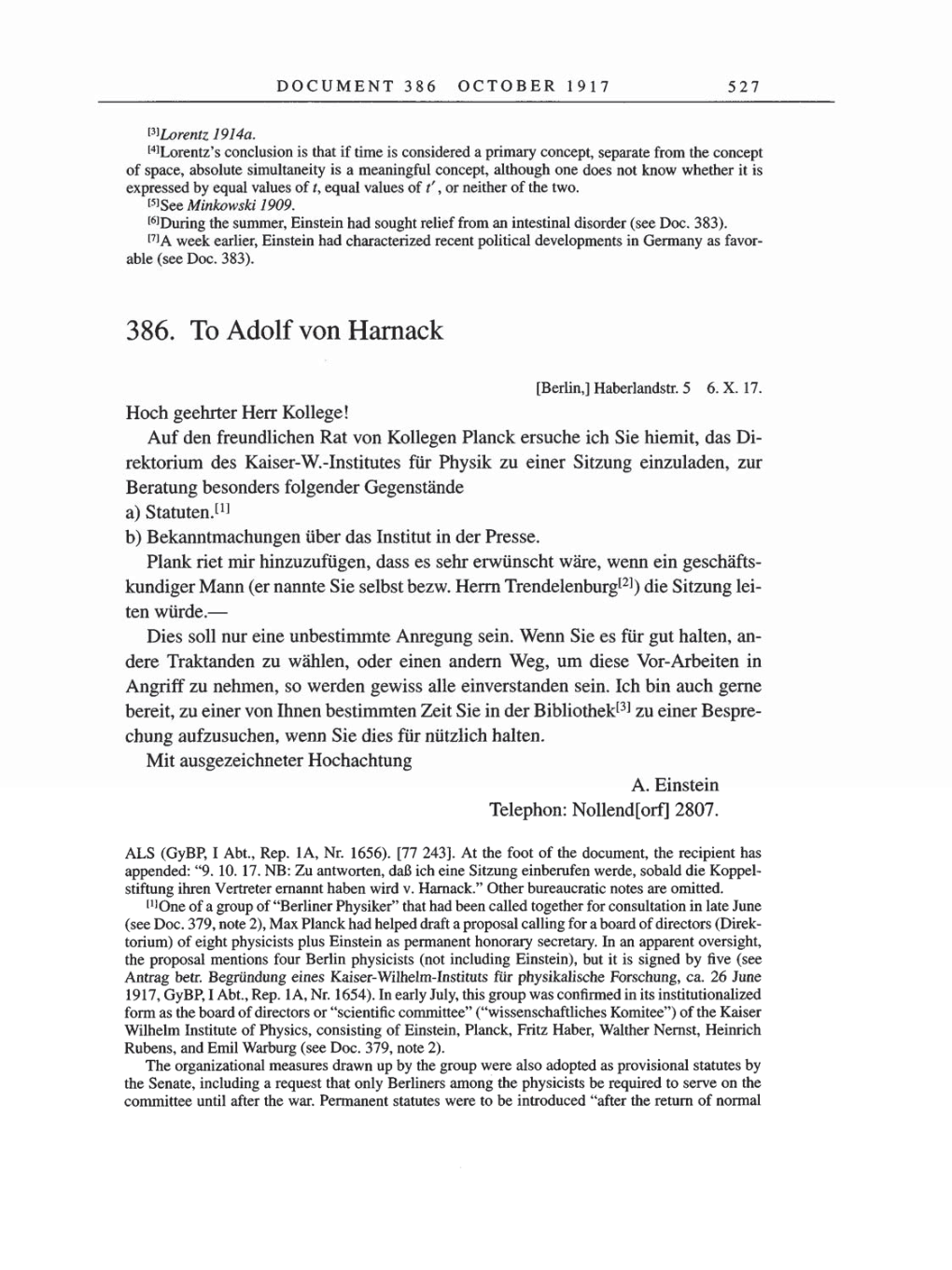DOCUMENT 386 OCTOBER 1917
527
[3]Lorentz
1914a.
[4]Lorentz’s conclusion is that
if
time is considered
a
primary
concept,
separate
from
the
concept
of
space,
absolute
simultaneity
is
a meaningful concept,
although
one
does not know
whether it
is
expressed
by equal
values
of
t,
equal
values
of
t',
or
neither
of
the
two.
[5]See
Minkowski 1909.
[6]During
the
summer,
Einstein had
sought
relief
from
an
intestinal disorder
(see
Doc.
383).
[7]A
week
earlier,
Einstein had characterized recent
political
developments
in
Germany as
favor-
able
(see
Doc.
383).
386.
To
Adolf
von
Harnack
[Berlin,]
Haberlandstr.
5
6. X.
17.
Hoch
geehrter
Herr
Kollege!
Auf
den freundlichen
Rat
von Kollegen
Planck ersuche
ich Sie
hiemit,
das Di-
rektorium
des Kaiser-W.-Institutes für
Physik
zu
einer
Sitzung
einzuladen,
zur
Beratung
besonders
folgender
Gegenstände
a)
Statuten.[1]
b) Bekanntmachungen
über
das Institut in der Presse.
Plank
riet
mir
hinzuzufügen,
dass
es
sehr
erwünscht
wäre,
wenn
ein
geschäfts-
kundiger
Mann
(er
nannte Sie selbst bezw. Herrn
Trendelenburg[2])
die
Sitzung
lei-
ten
würde.-
Dies soll
nur
eine
unbestimmte
Anregung
sein. Wenn Sie
es
für
gut
halten,
an-
dere Traktanden
zu
wählen,
oder
einen andern
Weg, um
diese Vor-Arbeiten in
Angriff
zu
nehmen,
so
werden
gewiss
alle einverstanden sein. Ich bin auch
gerne
bereit,
zu
einer
von
Ihnen
bestimmten
Zeit Sie in
der
Bibliothek[3]
zu
einer
Bespre-
chung
aufzusuchen,
wenn
Sie dies
für
nützlich halten.
Mit
ausgezeichneter Hochachtung
A.
Einstein
Telephon: Nollend[orf]
2807.
ALS
(GyBP,
I Abt.,
Rep.
1A,
Nr.
1656). [77 243].
At the
foot of
the
document,
the
recipient
has
appended:
“9.10.17.
NB: Zu
antworten,
daß ich eine
Sitzung
einberufen
werde,
sobald
die
Koppel-
stiftung
ihren Vertreter ernannt
haben
wird
v.
Hamack.”
Other
bureaucratic notes
are
omitted.
[1]One
of
a group
of
“Berliner
Physiker”
that had been
called
together
for consultation in late June
(see
Doc.
379,
note
2),
Max
Planck
had
helped
draft
a proposal calling
for
a
board
of
directors
(Direk-
torium)
of
eight physicists plus
Einstein
as permanent honorary secretary.
In
an apparent oversight,
the
proposal
mentions four
Berlin
physicists (not including
Einstein),
but it is
signed by
five
(see
Antrag
betr.
Begründung
eines Kaiser-Wilhelm-Instituts
für
physikalische Forschung, ca.
26 June
1917, GyBP,
I
Abt.,
Rep. 1A,
Nr.
1654).
In
early July,
this
group was
confirmed in its
institutionalized
form
as
the board
of
directors
or
“scientific committee”
(“wissenschaftliches Komitee”)
of
the Kaiser
Wilhelm
Institute
of
Physics,
consisting
of
Einstein, Planck,
Fritz
Haber,
Walther
Nernst,
Heinrich
Rubens,
and Emil
Warburg (see
Doc.
379,
note
2).
The
organizational measures
drawn
up by
the
group were
also
adopted as provisional
statutes
by
the
Senate, including a request
that
only
Berliners
among
the
physicists
be
required
to
serve on
the
committee
until
after the
war.
Permanent
statutes
were
to be
introduced
“after the
return
of
normal
